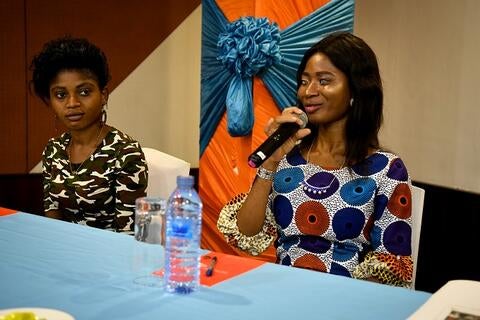Esther Nagatey is a level 200 student of the University of Ghana, studying Political Science and Philosophy. She also studied at Akuapeman Senior High School in the Eastern Region of Ghana. Esther a is highly motivated young lady who deems herself very fortunate and grateful for the opportunities she has had in her life, especially in view of the fact that persons with disability (PWDs) like herself are often marginalized in developmental efforts.
Her participation in the Information, Education, Communication (IEC) Materials Development workshop- organised by UNFPA in partnership with UNICEF under the auspices of the Canadian Government- was motivated by her belief that she has a responsibility to use every platform accessible to her to advocate for the interests of PWDs, especially the visually impaired. Esther is very passionate about her advocacy because of the challenges she faces as a student at the university. According to her, the educational system in Ghana after the basic school level is not very friendly to the visually impaired. Although at the basic level she had access to brail learning material, this was not the case in high school nor has it been at the university. She is forced to learn by depending on her course mates to read out textbooks to her. This does not create equal opportunities for learning seeing as she is competing with students who have unfettered access to learning material in terms of their physical capabilities. Worse, is the fact that certain courses and electives- due to university policy- are not available to the visually impaired, which limits available career choices.
“Not everybody is as strong as I am to tolerate these things…”
Another area of concern that Esther voices as much is she can, is that campaigns aimed at promoting PWDs’ inclusion and the elimination of discrimination against PWDs are not very effective in reducing the stigma and marginalization that they face. She recounts that her first encounter with a learning environment where PWDs are in the minority was in senior high school. Here, she had to deal with discrimination in the form of derogatory comments; a situation that has led to many PWDs dropping out of school.
“There are times people feel they are obligated to help…”
As a resident at the Akuafo Hall on the University of Ghana campus, Esther gets by very well on her own. She dislikes depending on others to show her around, unless it is absolutely necessary. Many times, she senses that the people get tired of offering their help or engaging PWDs meaningfully. It is therefore very encouraging when projects such as the IEC Materials Development workshop seeks to meaningfully engage PWDs like herself in the development of materials to bring Comprehensive Sexuality Education to young people, which includes young people living with disabilities. Here, their voices count.
“They believe I can do everything…”
Esther feels blessed and fortunate to have the family that she has. They have been a major motivating factor for many of her achievements because they push her to do things that she sometimes feels are impossible for her. She presses on because she does not want to let them down. Today, Esther is teaching herself to speak Spanish and Portuguese as part of preparations to become an International Relations and Diplomacy expert. She believes that she will make it, despite the odds against her.


